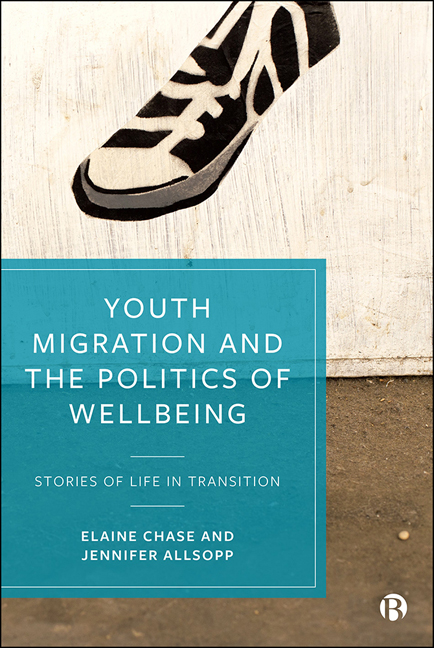Book contents
- Frontmatter
- Contents
- List of Figures
- Acknowledgements
- Foreword
- ‘Future’
- 1 Introduction
- 2 Conceptualizing Wellbeing in the Context of Migration and Youth Transitions
- 3 Capturing Wellbeing in Transition: An Alternative Approach
- 4 ‘Iron Rod’ or ‘Colander’? Welfare Regimes in England and Italy
- 5 The Pursuit of Safety and Freedom
- 6 Legal Integrity and Recognition
- 7 Identity and Belonging
- 8 Constructing Viable Futures as ‘Adults’
- 9 Emotional and Mental Wellbeing
- 10 Friendships, Connections and Relationships
- 11 Transnational Family and Connections
- 12 Conclusion
- Endnotes
- References
- Index
3 - Capturing Wellbeing in Transition: An Alternative Approach
Published online by Cambridge University Press: 21 April 2021
- Frontmatter
- Contents
- List of Figures
- Acknowledgements
- Foreword
- ‘Future’
- 1 Introduction
- 2 Conceptualizing Wellbeing in the Context of Migration and Youth Transitions
- 3 Capturing Wellbeing in Transition: An Alternative Approach
- 4 ‘Iron Rod’ or ‘Colander’? Welfare Regimes in England and Italy
- 5 The Pursuit of Safety and Freedom
- 6 Legal Integrity and Recognition
- 7 Identity and Belonging
- 8 Constructing Viable Futures as ‘Adults’
- 9 Emotional and Mental Wellbeing
- 10 Friendships, Connections and Relationships
- 11 Transnational Family and Connections
- 12 Conclusion
- Endnotes
- References
- Index
Summary
On one of our team residential trips to Cornwall, we took a walk along the stunning coastline between Boscastle and Tintagel, chatting as we went. A conversation sprung up between two of our team, one from Albania and one from Afghanistan. Offshore was a small rowing boat, and the Albanian colleague asked the other whether he had ever been rowing. ‘Yes,’ he replied. ‘I’m quite good at it.’ When asked how come, the response was, ‘I learnt coming from Turkey to Greece … it took about ten hours.’ There was a long pause as realization set in. Then came the follow up question:
‘Oh … so you made it then?’
‘Yes, I made it.’
‘Well done, mate!’
They both laughed. In that brief moment, a friendship was cemented.
Introduction
This anecdote captures much of what the project set out to do. We wanted to bring to light the diversity of young people's experiences and counter some of the homogenizing narratives concerning migrant young people that have come to dominate policy and practice, moving away from an objective analysis of young people's migratory experiences and instead presenting them as human personal challenges and triumphs. A key component of this was to design and execute a methodology that was inclusive, mutually beneficial and enriching.
This chapter provides an overview of the methodological approach to the research. It describes its participative and collaborative nature, which involved working closely with a team of young people who had previously migrated alone to the United Kingdom (UK) and Italy as core members of the research team. It outlines the rationale for the approach, how the countries of origin were selected, details of research participants, including how access was negotiated, and how contact was maintained with them over time.
The chapter then goes on discuss how beliefs, ideas and meanings surrounding wellbeing were reached inductively through questions that sought to determine what young people valued in their lives and what helped them to feel well and happy. There follows a discussion of how the analysis of findings was conducted, before some reflections on the ethical considerations and dilemmas posed by the research as well as its limitations and challenges.
- Type
- Chapter
- Information
- Youth Migration and the Politics of WellbeingStories of Life in Transition, pp. 37 - 54Publisher: Bristol University PressPrint publication year: 2020



